九年级英语上册第二单元知识点(新版)仁爱版
仁爱版九年级英语上册第二单元U2T2知识点归纳

仁爱版九年级英语上册第二单元U2T2.知识点归纳Topic 2 How does pollution hurt the earth?一、重点词汇(一)词形变换1. none (反义词) all2. both (反义词) neither3. rubbish (同义词) litter4.steal (过去式) stole (过去分词) stolen 5. spit (过去式;过去分词) spat6. behave (名词) behavior7. prevent (同义词) stop8. although (同义词)though 9. pollute (句词) pollution 10. completely (形容词) complete (二)重点词组1.read this article 看这篇文章2.here and there = everywhere 到处3.care for = look after = take care of 照顾4.give some advice to …提出一些建议给……5.set one’s mind to sth. 集中精力于……; 用心于……6.protect nature 保护自然7.wash away 冲走8.blow away 吹走;刮走9.turn into = change into 转变成10.die out 灭绝;绝迹11.stop / prevent …(from) doing sth. 阻止……做某事12.keep…from doing sth. 阻止……做某事13.move toward…朝……移动14.cut down 砍倒15.run away 跑走; 流走16.cut off 中断17.on the earth 在地球上18.be in danger of (doing) sth. 处于做某事的危险中19.destroy/ harm/ pollute the environment 破坏/损害/污染环境20.have a quiet life 过着平静的生活21.plenty of 大量的22.come to realize 开始意识23.have a clean-up 大扫除24.one after another 一个接着另一个25.on recycled paper 在再生纸上26.enter the competition 进入比赛27.offer one’s suggestion 提供某人的建议二、重点句型1.But the government has done something useful to protect the environment.但政府为了保护环境已做了一些有益的事。
仁爱版英语九年级上册Unit 2 Topic 2 重难点知识归纳总结
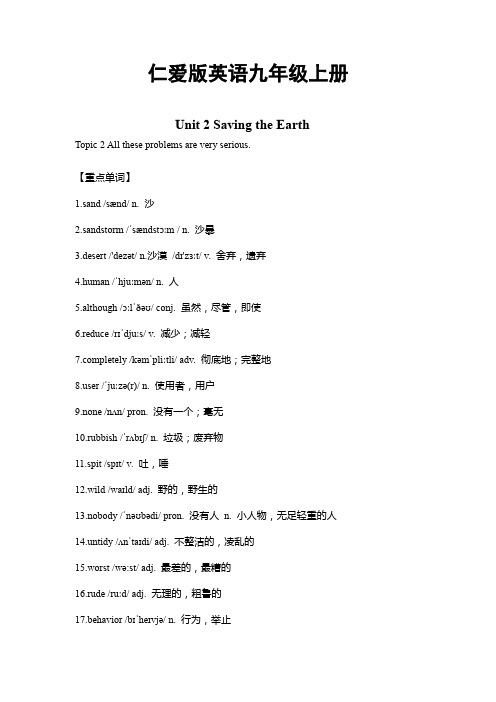
仁爱版英语九年级上册Unit 2 Saving the EarthTopic 2 All these problems are very serious.【重点单词】1.sand /sænd/ n. 沙2.sandstorm /ˈsændstɔːm / n. 沙暴3.desert /'dezət/ n.沙漠/dɪ'zɜːt/ v. 舍弃,遗弃4.human /ˈhjuːmən/ n. 人5.although /ɔːlˈðəʊ/ conj. 虽然,尽管,即使6.reduce /rɪˈdjuːs/ v. 减少;减轻pletely /kəmˈpliːtli/ adv. 彻底地;完整地er /ˈjuːzə(r)/ n. 使用者,用户9.none /nʌn/ pron. 没有一个;毫无10.rubbish /ˈrʌbɪʃ/ n. 垃圾;废弃物11.spit /spɪt/ v. 吐,唾12.wild /waɪld/ adj. 野的,野生的13.nobody /ˈnəʊbədi/ pron. 没有人n. 小人物,无足轻重的人14.untidy /ʌnˈtaɪdi/ adj. 不整洁的,凌乱的15.worst /wə:st/ adj. 最差的,最糟的16.rude /ruːd/ adj. 无理的,粗鲁的17.behavior /bɪˈheɪvjə/ n. 行为,举止18.situation /ˌsɪtʃuˈeɪʃn/ n. 状况;形势;局面19.punish /ˈpʌnɪʃ/ v. 处罚,惩罚20.perhaps /pəˈhæps/ adv. 可能,大概21.everybody /ˈevribɒdi / pron. 人人,每个人22.nowhere /ˈnəʊweə(r)/ adv. 无处;哪里都不23.oxygen /ˈɒksɪdʒən/ n. 氧气24.hole /həʊl/ n. 洞,坑25.ozone layer /ˈəʊzəʊn ˈleɪə(r)/ 臭氧层26.radiation /ˌreɪdiˈeɪʃn / n. 放射,放射物27.directly /dəˈrektli/ adv. 直接地28.carbon dioxide /ˈkɑːbən daɪˈɒksaɪd/ 二氧化碳29.form /fɔːm/ v. (使)出现;(使)形成n. 种类;形式30.blanket /ˈblæŋkɪt/ n. 毛毯,毯子31.escape /ɪˈskeɪp/ v. 渗出;逃跑;逃脱32.rise /raɪz/ v. 上升;起床;升起33.shortage /ˈʃɔːtɪdʒ/ n. 不足;缺少;短缺34.avoid /əˈvɔɪd/ v. 防止,避免35.resource /rɪˈsɔːs/ n. 资源;财力36.discover /dɪˈskʌvə(r)/ v. 发现,找到37.reuse /ˌriːˈjuːs/ v. 再次使用;重复使用38.thirsty /ˈθɜːsti/ adj. 缺水的;(口)渴的39.nearly /ˈnɪəli/ adv. 几乎,将近w /lɔː/ n. 法律,法令;定律【重点短语】1.as a result 结果2.change into 转换成,变成3.stop...from 阻止……做4.blow...away 把……吹走5.wash...away 把……冲走e into being 形成7.do something useful 做一些有用的事情8.here and there 在各处;到处9.care for 关心,照顾10.cut down 砍倒11.the greenhouse effect 温室效应12.take away 拿走13.refer to 涉及;指的是14.make some progress 取得一些进步15.be covered with 被……覆盖16.day by day 一天天;逐日【重点句型】1.As a result, a lot of rich land has changed into desert.结果,许多肥沃的土地变成了沙漠。
仁爱版九年级上册英语第二单元Topic2-知识点复习总结
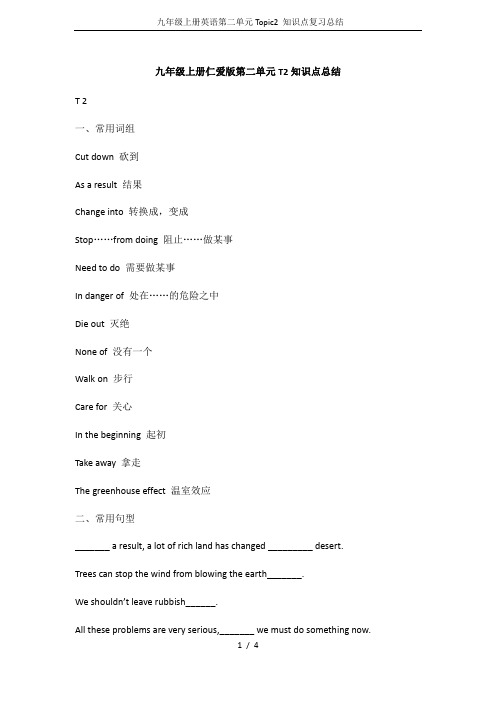
九年级上册仁爱版第二单元T2知识点总结T 2一、常用词组Cut down 砍到As a result 结果Change into 转换成,变成Stop……from doing 阻止……做某事Need to do 需要做某事In danger of 处在……的危险之中Die out 灭绝None of 没有一个Walk on 步行Care for 关心In the beginning 起初Take away 拿走The greenhouse effect 温室效应二、常用句型_______ a result, a lot of rich land has changed _________ desert. Trees can stop the wind from blowing the earth_______.We shouldn’t leave rubbish______.All these problems are very serious,_______ we must do something now.三、语法知识1.The wind is so strong.风大用strong来修饰。
2.Change……into=turn……into 把……变成3.Stop……from doing sthPrevent……from doing sthKeep……from doing sth4.Save v. 贮存,保存Save sb sth=save sth for sb 为某人保留Will you save me a seat in the bus?Save 节约,节省,避免(金钱,时间,精力等的)浪费We’ll save a lot of time if we go by bus.Save 救,拯救,挽救Save one’s life 拯救某人的生命He saved his friends’ life inthe accident.5.Cut down 砍到,减少,缩短Cut out “用剪刀”剪下Cut in 插嘴,打断(谈话)Cut off 切断(电源,水)中断Cut up 切碎,剁碎e to 想到,意识到;(数量)总计,总共的意思7.The importance of ……的重要性8.It says that 此句型主语是事或物,用文字,数字等传达或表明信息It is said that 据说It is reported that 据报道It is well known that 众所周知It is believed that 人们相信9.Something useful adj修饰复合不定代词时,要放在所修饰词的后面,做后置定语。
仁爱版九年级上册英语第二单元知识点总结

仁爱版九年级上册英语第二单元知识点总结一、重点词汇1. concentrate: 集中注意力2. progress: 进步3. technique: 技术,技巧4. motivate: 激励,鼓励5. challenge: 挑战6. memorize: 记住7. grammar: 语法8. structure: 结构9. dialogue: 对话10. pronunciation: 发音二、重点句型1. How can I improve my English quickly? (如何才能快速提高我的英语?)2. You should read more English books. (你应该多读英文书。
)3. Can you give me some advice on how to improve my listening skills? (你能给我一些建议如何提高我的听力技能吗?)4. It’s important to practice speaking with others. (和别人练习口语很重要。
)5. I think the best way to learn grammar is to do more exercises.(我认为学习语法的最好方法是做更多的练习。
)三、语法重点1. 时态的使用2. 被动语态的构成与运用3. 语法结构的灵活运用四、阅读技巧1. 注重文章中的关键词2. 注意上下文的逻辑关系3. 提高阅读速度和理解能力五、听力技巧1. 练习听力短文,提高听力技能2. 注意语速和语调的变化3. 注意听取关键信息六、口语表达1. 培养说英语的自信心2. 练习日常交际用语3. 学会模仿优秀的口语表达者,提高自己的口语水平4. 积极参与英语口语练习和交流七、写作技巧1. 多读范文,学习优秀的写作风格2. 学会使用连接词,提高文章的连贯性3. 多加练习,提高写作水平4. 注意语法和拼写错误的改正八、口语练习1. 找一个练习口语的伙伴,共同提高口语水平2. 参加英语角或者英语俱乐部,扩大口语交流的机会3. 每天坚持练习口语,保持口语水平的稳定提升九、总结本单元主要围绕着英语学习的各个方面展开,包括阅读、听力、口语、写作等方面的技巧和方法。
仁爱版九年级英语上册Unit2 知识点总结
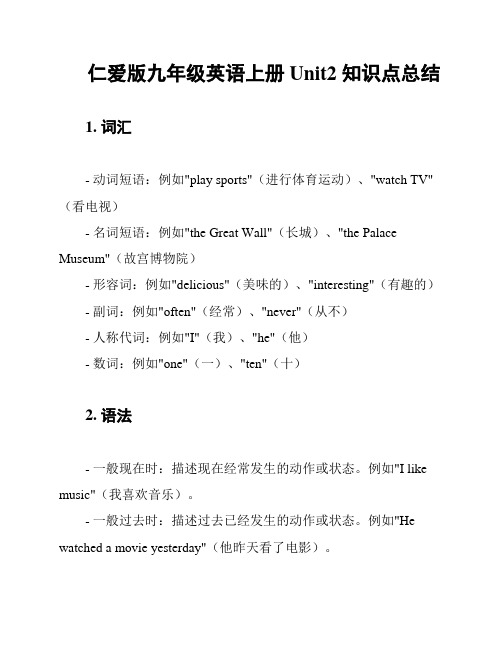
仁爱版九年级英语上册Unit2 知识点总结1. 词汇- 动词短语:例如"play sports"(进行体育运动)、"watch TV"(看电视)- 名词短语:例如"the Great Wall"(长城)、"the Palace Museum"(故宫博物院)- 形容词:例如"delicious"(美味的)、"interesting"(有趣的)- 副词:例如"often"(经常)、"never"(从不)- 人称代词:例如"I"(我)、"he"(他)- 数词:例如"one"(一)、"ten"(十)2. 语法- 一般现在时:描述现在经常发生的动作或状态。
例如"I like music"(我喜欢音乐)。
- 一般过去时:描述过去已经发生的动作或状态。
例如"He watched a movie yesterday"(他昨天看了电影)。
- 现在进行时:描述当前正在进行的动作。
例如"We are playing basketball"(我们正在打篮球)。
- 比较级与最高级:用于比较两个或多个事物的不同程度。
例如"He is taller than his brother"(他比他兄弟高)。
- 物主代词:表示所属关系。
例如"This is my book"(这是我的书)。
3. 句型- 陈述句:陈述一个事实或描述一个状态。
例如"I am a student"(我是一名学生)。
- 疑问句:用来提问。
例如"Do you like English?"(你喜欢英语吗?)。
最新仁爱九年级英语上册Unit 2 Topic 3 知识点归纳与练习
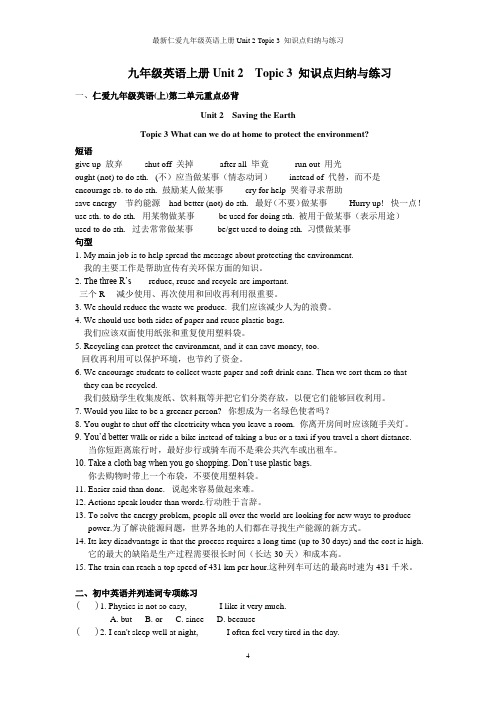
九年级英语上册Unit 2 Topic 3 知识点归纳与练习一、仁爱九年级英语(上)第二单元重点必背Unit 2 Saving the EarthTopic 3 What can we do at home to protect the environment?短语give up 放弃shut off 关掉after all 毕竟run out 用光ought (not) to do sth. (不)应当做某事(情态动词)instead of 代替,而不是encourage sb. to do sth. 鼓励某人做某事cry for help 哭着寻求帮助save energy 节约能源had better (not) do sth. 最好(不要)做某事Hurry up! 快一点!use sth. to do sth. 用某物做某事 be used for doing sth. 被用于做某事(表示用途)used to do sth. 过去常常做某事be/get used to doing sth. 习惯做某事句型1. My main job is to help spread the message about protecting the environment.我的主要工作是帮助宣传有关环保方面的知识。
2. T he three R’s------reduce, reuse and recycle are important.三个R----减少使用、再次使用和回收再利用很重要。
3. We should reduce the waste we produce. 我们应该减少人为的浪费。
4. We should use both sides of paper and reuse plastic bags.我们应该双面使用纸张和重复使用塑料袋。
5. Recycling can protect the environment, and it can save money, too.回收再利用可以保护环境,也节约了资金。
仁爱版英语九年级上册Unit2-Unit4知识点归纳

仁爱版英语九年级上册Unit2-Unit4知识点归纳U2 Topic 2I. 重点词组1. as a result 结果2. here and there 到处3. in the beginning 一开始4. in danger 处于危险中5. cut down 砍倒6. change sth. into sth. 把……变成……7. prevent from 防止8. greenhouse effect 温室效应9. refer to 提到10.deal with 处理11.take up 占据12.cut off 中断II. 重点句型1. As we know, none of us likes pollution. 众所周知,没有人喜欢污染。
none与no one 的区别:a)none “全无”,既可指人也可指物,后常跟of 的短语; 作主语时,谓语动词既可用单数也可用复数;no one只指人,后不能跟of 的短语; 作主语时,谓语动词只用作单数。
如:He has read none of these books.(指物)这些书他一本都没看过。
None of my friends like/ likes drawing.(指人)我的朋友们没有一个喜欢画画。
No one is here.没有一个在这儿。
b)none回答how many/ much的问题;no one回答who的问题。
如:A: How many students come to school by taxi? B: None.有多少的学生搭出租车来上学?没有人。
A: How much water is there in the bottle? B: None.瓶子里有多少水?一点儿也没有。
A: Who is in the room? B: No one.谁在房中?没有人。
2、Trees can also stop the wind blowing the earth away.树木也能防风固土。
仁爱英语九年级上册unit2知识点

仁爱英语九年级上册unit2知识点仁爱英语九年级上册Unit 2 知识点Unit 2 是仁爱英语九年级上册的一篇重要课文,本单元主要讲述了关于城市规划的话题。
在这篇课文中,我们了解了城市规划的重要性以及如何使城市更加宜居。
本文将以讲述城市规划的目的、城市规划的原则和城市规划的实施三个方面,来介绍Unit 2的知识点。
一、城市规划的目的城市规划的目的是为了创造一个宜居而美丽的城市。
城市人口的急剧增长,给城市带来了许多问题,例如拥堵的交通、污染的环境和不足的基础设施。
因此,城市规划的目的是通过科学合理的规划手段来解决这些问题,提高城市居民的生活质量。
二、城市规划的原则城市规划需要遵循一些基本的原则。
首先是可持续发展原则,即在城市规划中要考虑到环境保护、资源利用和经济发展的平衡。
其次是社区发展原则,即建设有具体特色和功能的社区,使居民们可以方便地生活、工作和娱乐。
此外,城市规划还应该注重公平性,即不同社会阶层的人都能享受到城市发展的成果。
三、城市规划的实施城市规划的实施需要经过一系列的步骤。
首先是调查研究阶段,在这个阶段,规划者将对城市进行详细的调查研究,包括人口、用地、交通等方面的数据收集。
然后是规划设计阶段,根据前期的调查研究结果,规划者会制定出具体的城市规划方案。
接下来是公众参与阶段,规划者会与居民们共同商讨规划方案,并听取他们的意见和建议。
最后是实施和监督阶段,一旦规划方案确定,就需要投入资金和资源来实施,并通过监督和评估来确保规划方案的顺利进行。
在学习Unit 2的过程中,我们不仅了解了城市规划的概念和重要性,还学习了一些相关的词汇和表达方式。
这些知识对我们了解城市发展,培养环保意识以及提高英语水平都有很大的帮助。
总之,通过学习Unit 2,我们了解了城市规划的目的、原则和实施步骤。
城市规划是为了创造一个宜居而美丽的城市,需要遵循可持续发展、社区发展和公平性的原则,并经过调查研究、规划设计、公众参与以及实施和监督等一系列步骤来完成。
仁爱版九年级英语上册教材Unit2单元知识点梳理课件

fruits, such as
B.kind of D. some kind of
apples, banan-
考点3
【跟踪训练】
①C
the sun was not yet up, many people were al-
ready taking exercise in the square.
A. As
A.In general
B.So far
C. After all
D.For example
( C )14.A little wine will not be
health. Just don't drink too much.
A.helpful
B. helpless
C.harmful
D. harmless
A.I agree with you B.Never mind
C.I disagree
D. That's right
( C )13.—I'm afraid the boy can't deal with the prob-
lem.
— Me, too.
, he is only 8 years old.
2.Light pollution is harmful to our eyes. ( 改 为 同 义 句 )
Light pollution does
harm to our eyes.
3.I use cloth bags for shopping.(对划线部分提问)
What ping?
kind of bags do you use for shop-
A. Not all
初中英语 仁爱版九年级上册Unit2 Topic 2知识点
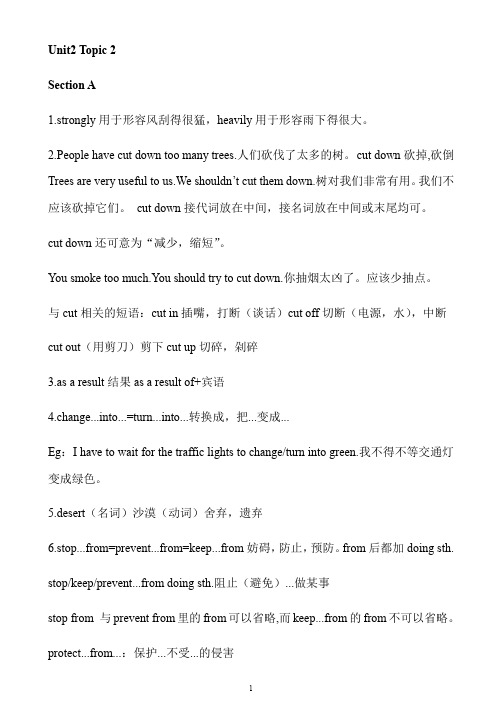
Unit2 Topic 2Section A1.strongly用于形容风刮得很猛,heavily用于形容雨下得很大。
2.People have cut down too many trees.人们砍伐了太多的树。
cut down砍掉,砍倒Trees are very useful to us.We shouldn’t cut them down.树对我们非常有用。
我们不应该砍掉它们。
cut down接代词放在中间,接名词放在中间或末尾均可。
cut down还可意为“减少,缩短”。
You smoke too much.You should try to cut down.你抽烟太凶了。
应该少抽点。
与cut相关的短语:cut in插嘴,打断(谈话)cut off切断(电源,水),中断cut out(用剪刀)剪下cut up切碎,剁碎3.as a result结果as a result of+宾语4.change...into...=turn...into...转换成,把...变成...Eg:I have to wait for the traffic lights to change/turn into green.我不得不等交通灯变成绿色。
5.desert(名词)沙漠(动词)舍弃,遗弃6.stop...from=prevent...from=keep...from妨碍,防止,预防。
from后都加doing sth. stop/keep/prevent...from doing sth.阻止(避免)...做某事stop from 与prevent from里的from可以省略,而keep...from的from不可以省略。
protect...from...:保护...不受...的侵害7. A lot of water can be saved by forests.森林可以贮存大量的水分。
save贮存,保留,保存。
九年级上册英语仁爱第二单元知识点总结
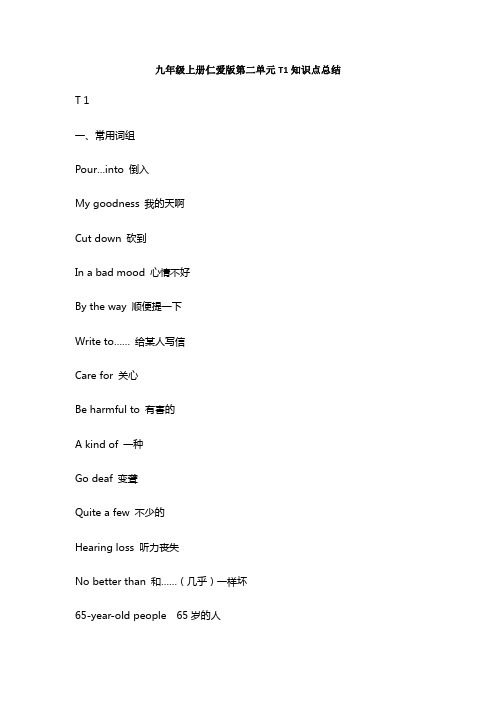
九年级上册仁爱版第二单元T1知识点总结T 1一、常用词组Pour…into 倒入My goodness 我的天啊Cut down 砍到In a bad mood 心情不好By the way 顺便提一下Write to……给某人写信Care for 关心Be harmful to 有害的A kind of 一种Go deaf 变聋Quite a few 不少的Hearing loss 听力丧失No better than 和……(几乎)一样坏65-year-old people 65岁的人In public 在公共场合Do great harm to 多……有很大的伤害Try to do 尽力做某事Be bad for 对……有很大的伤害High blood pressure 高血压As well 也二、重点句型1.Oh, what a ________ !2.There are several chemical factories_____ waste water into the stream.3.What’s______, the factory makes too much noise……4.Noise is_____, to human’s health.5.People who work and live in noisy conditions often_______ deaf.6.…many teenagers in America can hear no ______ than 65-year-old people do,…7.…does great_____to people’s hearing.三、语法知识1.一般过去时:I went there two years ago.2.Lots of=a lot of3.Sounds great! 听起来不错!4.What a mess! 真糟糕!5.Go vi. 不复存在,不见了,丢失,失窃The flowers and grass here gone!My new bike has gone!6.What a shame!=what a pity! 真遗憾!7.There be+sb/sth+doing sth 有某人或某物正在做某事There be sth/sb to do sth 有某人/某物做某事There are two people waiting outside.There is no time to think.There were few machines to help us to do farm work in the past.8.Waste adj.废弃的,无用的,丢弃的n. 浪费,废弃物A waste of time 浪费时间waste one’s words 白费口舌9.Breathe v. 呼吸breath n.Breathe in 吸入breathe out 呼出hold one’s breath 屏住呼吸take a deep breath 深深地吸一口气10.How long 多久以后for/sinceHow soon 多久以后in+一段时间How often 频率once/twice a weekHow far 多远(距离)米(单位)11.Produce 产生,造成,引起,表结果(侧重工业生产,农产品,也包括创造脑力劳动产品)Make含义广泛,没有具体限制生产任何产品12.What’s worse 更糟糕的是13.Too much 太多+un. There is too much water leftMuch too 实在太,非常,常用在adv或adj前面14.Bear v. 承受,忍受She can’t bear to watch them suffer.Bear n.熊,鲁莽的人He is a perfect bear. 他是一个十足的鲁莽汉。
初中英语仁爱版九年级上册Unit2Topic1知识点

初中英语仁爱版九年级上册Unit2Topic1知识点Unit2 Topic1Section A1.gone(不及物动词)不复存在,不见了,丢失,失窃2.XXX有某人或某物正在做某事Eg:There are some boys running on the playground.有一些男孩正在操场上跑步。
XXX.有某人/某物做某事Eg:There is no time to think.没有时间去想了。
3.pour...into...把...倒入...4.waste(形容词)废弃的,丢弃的,无用的(名词)废弃物,废料(动词)浪费waste of time浪费时间waste of money浪费金钱Section B1.It’s difficult for sb. to do sth.做某事对某人来说很困难2.howlong多久,多长时间,用来询问或谈论某段时间,答语通常用for,since等引导的时间状语,谓语动词必须为延续性动词。
—How long have you learned English?—I have learned English for three years.3.in a bad mood不爽,心情不好。
4.bear(动词)忍受,蒙受(名词)熊,鲁莽的人XXX 忍受...,对...有耐烦Eg:Please bear with me while I ask some questions.当我发问你时,请耐烦些。
作动词时常能够stand交换,stand蒙受,禁受;忍受,容忍,常与can,could 1连用。
stand+名词/代词/doing:忍受某人/某事/做某事I can’t stand working in an offic e.我几乎受不了在办公室工作。
5.anyway不管如何,使用时常常位于句子开头迁移转变处。
6.write to写信给...Section C1.be harmful to =do harm to =be bad for对...有害harm sb./sth.伤害某人/某物Reading in the sun is XXX在太阳底下读书对眼睛有害。
最新仁爱版九年级英语上册第二单元知识点

最新仁爱版九年级英语上册第二单元知识点U2T1SA1 The flowers and grass have gone.花儿和草都消失啦。
go 在此处为不及物动词,意为“不复存在,不见了,丢失,失窃”。
e.g. My new bike has gone. I can’t find it. 我的新自行车不见了,我找不到它了。
2 Look , there are several chemical factories pouring waste water into the stream. 看,有几个化学工厂正把废水排入河流中呢。
a. There be + sth. /sb. doing sth.为固定句型,意为“有某人或某物正在做某事”。
e.g. Look! There is a little girl crying in the street.瞧!有个小女孩正在街上哭。
b. pour ... into把……倒入。
e.g. Please pour the sugar into a cup.请把糖倒入杯里。
c. waste adj. 废弃的,无用的,丢弃的。
n. 浪费,废弃物 e.g. a waste of time 浪费时间。
v. 浪费e.g. waste one’s words 白费口舌。
U2T1SB1 breathe v.意为“呼吸”,名词是breath,注意不同词性时单词的拼写。
e.g. We breathe fresh air.我们呼吸新鲜的空气。
You can see your breath on a very cold day.你可以在寒冷的天看到你的呼吸。
breathe in吸入,breathe out呼出,hold one’s breath屏住呼吸,take a (deep) breath (深深地)吸一口气。
2 produce v.在此意为“产生,造成,引起”, 表示结果。
注意:produce一般侧重工业生产,农业产品,也包括创造脑力劳动产品,而make 含义很广,没有具体限制生产何种产品。
九年级英语上册unit2知识点汇总仁爱版(完整资料).doc
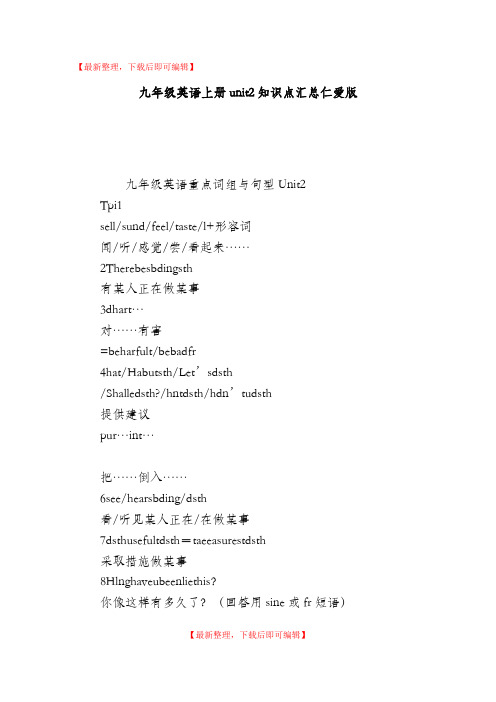
【最新整理,下载后即可编辑】九年级英语上册unit2知识点汇总仁爱版九年级英语重点词组与句型Unit2Tpi1sell/sund/feel/taste/l+形容词闻/听/感觉/尝/看起来……2Therebesbdingsth有某人正在做某事3dhart…对……有害=beharfult/bebadfr4hat/Habutsth/Let’sdsth/Shalledsth?/hntdsth/hdn’tudsth提供建议pur…int…把……倒入……6see/hearsbding/dsth看/听见某人正在/在做某事7dsthusefultdsth=taeeasurestdsth采取措施做某事8Hlnghaveubeenliethis?你像这样有多久了?(回答用sine或fr短语)【最新整理,下载后即可编辑】9aesbdsth使某人做某事0aenise制造噪音1hat’sre而且2beinagd/badd心情好/坏3standsth/ding忍受某事/做某事4anagetdsth努力做某事ritetsb给某人写信6hadbetterdsth最好做某事hadbetterntdsth最好不要做某事7ntall不是所有ntever不是每一个【最新整理,下载后即可编辑】8quiteafe相当多9nbetterthan与……一样差,不比……好20ausesbtdsth导致某人做某事21trtdsth努力做某事22allsrts/indsf各种各样23ntnl……butals不仅……而且……24asell也(置于句末)2inanas在许多方面;以许多方式26Itisreprted/saidthat+从句据报道/据说Tpi227asaresult因此28leavesthsp把某物遗忘在某地【最新整理,下载后即可编辑】29leavesthhereandthere乱扔……30aln踩踏31arefr关心,照顾=taearef/lafter32deverthingsbantdsth尽某人最大努力做某事=tr/dne'sbesttdsth33evenrse更糟糕的是34nnef代词/名词没有……3inthebeginning一开始36betterandbetter越来越好37dabda一天天38beindanger处于危险中【最新整理,下载后即可编辑】39beindangerf面临……的危险40etrealize逐渐意识到41ustn现在,刚才42stp/eep/prevent…frdingsth防止……做某事43needtdsth需要做某事44ash/blaa冲走/吹走4inpubli在公共场合46eintbeing形成47turnff/n/up/dn关掉/打开/调高/调低48dealith=dith处理解决49taeaa【最新整理,下载后即可编辑】带走0blstrngl风刮得厉害1aldnthestreet在街上走2hangeint把……转换成8prtettheenvirnent保护环境64reeber/frgettdsth记得/忘记(不)做某事6bebad/gdfr对……有害/有益67refert提到/涉及68havediffiult/truble/prblesdingsth有困难做某事69taeup占据Tpi370pisthup捡起某物【最新整理,下载后即可编辑】71Hften多久一次72rfr为……工作73beusedfrding某物被用于做某事74taeasher淋浴7usesthtdsth用某物做某事76It’sapitthat+从句很遗憾……77enuragesbtdsth鼓励某人做某事78It’sindfsbtdsth某人做某事好79besuppsedtdsth应该做某事80I’dlvet我乐意81ughttd【最新整理,下载后即可编辑】应该做某事否定ughtnttd82insteadfding而不是做某事83ntie准时84intie及时8Thereillbesthtd有某事要去做86aesuretdsth确定做某事87push…frard/dn向前/下推……88pull…up向上拉……【最新整理,下载后即可编辑】。
仁爱版英语九年级上册Unit 2 Topic 3知识点
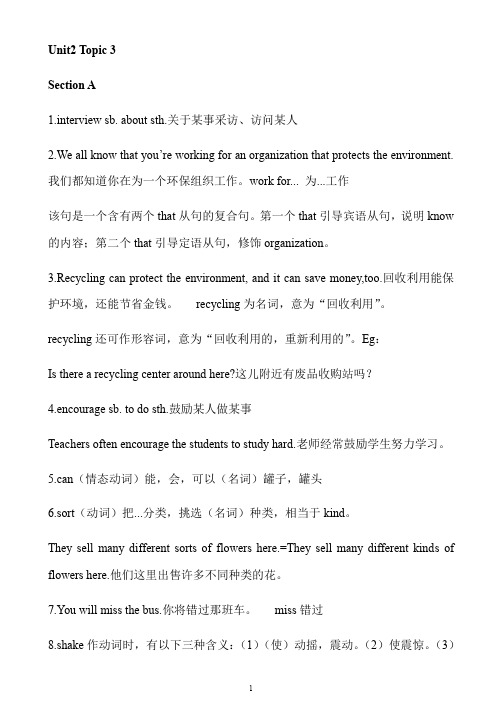
Unit2 Topic 3Section A1.interview sb. about sth.关于某事采访、访问某人2.We all know that you’re working for an organization that protects the environment.我们都知道你在为一个环保组织工作。
work for... 为...工作该句是一个含有两个that从句的复合句。
第一个that引导宾语从句,说明know 的内容;第二个that引导定语从句,修饰organization。
3.Recycling can protect the environment, and it can save money,too.回收利用能保护环境,还能节省金钱。
recycling为名词,意为“回收利用”。
recycling还可作形容词,意为“回收利用的,重新利用的”。
Eg:Is there a recycling center around here?这儿附近有废品收购站吗?4.encourage sb. to do sth.鼓励某人做某事Teachers often encourage the students to study hard.老师经常鼓励学生努力学习。
5.can(情态动词)能,会,可以(名词)罐子,罐头6.sort(动词)把...分类,挑选(名词)种类,相当于kind。
They sell many different sorts of flowers here.=They sell many different kinds of flowers here.他们这里出售许多不同种类的花。
7.You will miss the bus.你将错过那班车。
miss错过8.shake作动词时,有以下三种含义:(1)(使)动摇,震动。
(2)使震惊。
(3)(身体)颤抖,发抖,哆嗦。
作名词时,意为“摇动,抖动,颤动”。
九年级上册英语仁爱版第二单元T3知识点总结
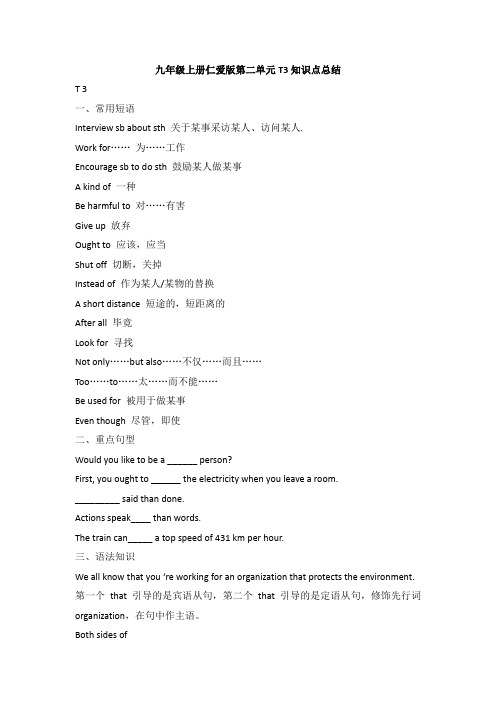
九年级上册仁爱版第二单元T3知识点总结T 3一、常用短语Interview sb about sth 关于某事采访某人、访问某人.Work for……为……工作Encourage sb to do sth 鼓励某人做某事A kind of 一种Be harmful to 对……有害Give up 放弃Ought to 应该,应当Shut off 切断,关掉Instead of 作为某人/某物的替换A short distance 短途的,短距离的After all 毕竟Look for 寻找Not only……but also……不仅……而且……Too……to……太……而不能……Be used for 被用于做某事Even though 尽管,即使二、重点句型Would you like to be a ______ person?First, you ought to ______ the electricity when you leave a room._________ said than done.Actions speak____ than words.The train can_____ a top speed of 431 km per hour.三、语法知识We all know that you ‘re working for an organization that protects the environment. 第一个that引导的是宾语从句,第二个that引导的是定语从句,修饰先行词organization,在句中作主语。
Both sides ofEach side ofRecycling n. 回收,利用The children are very enthusiastic about recycling.Adj. 回收利用的,重新利用的Is there a recycling center around here?Save money 省钱Encourage sb (not)to do sth 鼓励某人做某事--Thank you--it’s pleasure/that’s all rightFail the exam 考试失败Can 情态动词能;会;可以you can go.名词罐子,罐头I bought a can of Coke yesterday.Sort v. 把……分类,挑选n. 种类=kindThey sorted the apples according to size into large ones and small ones. They sell many different sorts(kinds) of wine here.Can be recycled 被回收情态动词的被动语态Rose can be planted in my hometown.Miss 错过v.Hurry up, or you will miss the bus.Shake v.动摇,震动The whole house shakes when a train goes past.使震惊He was badly shaken by the news of her death.颤抖,发抖,哆嗦I was shaking like a leafn. 动摇,抖动,颤动She gave him a shake to wake him.Ought to P52Easier said than done.Actions speak louder than words.People all over the world 世界各地的人就近原则:Not only ……but also/either……or/neither……nor/there be Not only he but also I am good at English.连接并列谓语时,not前面可有助动词He not only said it, but also did it.Reach a speed of+具体速度“达到某种速度”Reach可与achieve互换At a speed of+具体速度“以某种速度”Speed前面可用high,low.full 等形容词修饰。
九年级英语上册第二单元知识点(新版)仁爱版
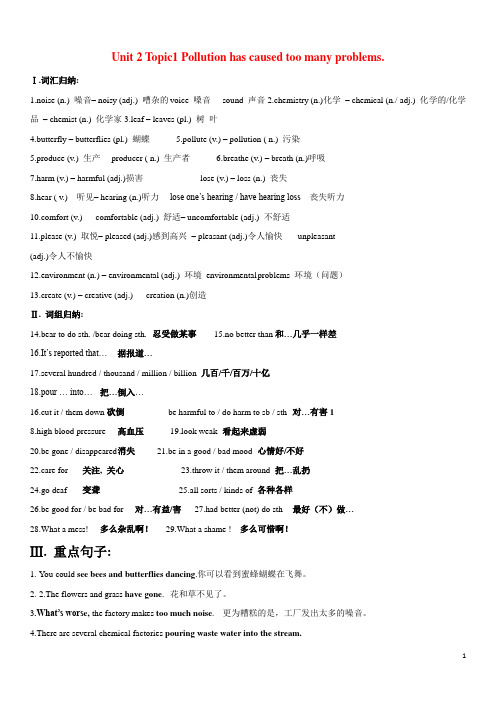
Unit 2 Topic1 Pollution has caused too many problems.Ⅰ.词汇归纳:1.noise (n.) 噪音– noisy (adj.) 嘈杂的 voice 嗓音sound 声音2.chemistry (n.)化学– chemical (n./ adj.) 化学的/化学品– chemist (n.) 化学家3.leaf – leaves (pl.) 树叶4.butterfly – butterflies (pl.) 蝴蝶5.pollute (v.) – pollution ( n.) 污染5.produce (v.) 生产--- producer ( n.) 生产者6.breathe (v.) – breath (n.)呼吸7.harm (v.) – harmful (adj.)损害lose (v.) – loss (n.) 丧失8.hear ( v.) 听见– hearing (n.)听力lose one’s hearing / have hearing loss 丧失听力fort (v.) --- comfortable (adj.) 舒适– uncomfortable (adj.) 不舒适11.please (v.) 取悦– pleased (adj.)感到高兴– pleasant (adj.)令人愉快--- unpleasant(adj.)令人不愉快12.environment (n.) – environmental (adj.) 环境environmental p roblems 环境(问题)13.create (v.) – creative (adj.) --- creation (n.)创造Ⅱ. 词组归纳:14.bear to do sth. /bear doing sth.忍受做某事15.no better than 和…几乎一样差16.It’s reported that…据报道…17.several hundred / thousand / million / billion 几百/千/百万/十亿18.pour … into…把…倒入…16.cut it / them down砍倒be harmful to / do harm to sb / sth 对…有害18.high blood pressure 高血压19.look weak 看起来虚弱20.be gone / disappeared 消失21.be in a good / bad mood 心情好/不好22.care for 关注, 关心23.throw it / them around 把…乱扔24.go deaf 变聋25.all sorts / kinds of 各种各样26.be good for / be bad for 对…有益/害27.had better (not) do sth 最好(不)做…28.What a mess! 多么杂乱啊!29.What a shame ! 多么可惜啊!Ⅲ. 重点句子:1.You could see bees and butterflies dancing.你可以看到蜜蜂蝴蝶在飞舞。
- 1、下载文档前请自行甄别文档内容的完整性,平台不提供额外的编辑、内容补充、找答案等附加服务。
- 2、"仅部分预览"的文档,不可在线预览部分如存在完整性等问题,可反馈申请退款(可完整预览的文档不适用该条件!)。
- 3、如文档侵犯您的权益,请联系客服反馈,我们会尽快为您处理(人工客服工作时间:9:00-18:30)。
Unit 2 Topic1 Pollution has caused too many problems.Ⅰ.词汇归纳:1.noise (n.) 噪音– noisy (adj.) 嘈杂的 voice 嗓音sound 声音2.chemistry (n.)化学– chemical (n./ adj.) 化学的/化学品– chemist (n.) 化学家3.leaf – leaves (pl.) 树叶4.butterfly – butterflies (pl.) 蝴蝶5.pollute (v.) – pollution ( n.) 污染5.produce (v.) 生产--- producer ( n.) 生产者6.breathe (v.) – breath (n.)呼吸7.harm (v.) – harmful (adj.)损害8.hear ( v.) 听见– hearing (n.)听力lose one’s hearing / have hearing loss 丧失听力9.lose (v.) – loss (n.) 丧失fort (v.) --- comfortable (adj.) 舒适– uncomfortable (adj.) 不舒适11.please (v.) 取悦– pleased (adj.)感到高兴– pleasant (adj.)令人愉快 --- unpleasant(adj.)令人不愉快12.environment (n.) – environmental (adj.) 环境 environmental problems 环境(问题)13.create (v.) – creative (adj.) --- creation (n.)创造Ⅱ. 词组归纳:14.bear to do sth. /bear doing sth. 忍受做某事15.no better than 和…几乎一样差16.It’s reported that…据报道…17.several hundred / thousand / million / billion 几百/千/百万/十亿18.pour … into…把…倒入…16.cut it / them down 砍倒17.be harmful to / do harm to sb / sth 对…有害18.high blood pressure 高血压19.look weak 看起来虚弱20.be gone / disappeared 消失21.be in a good / bad mood 心情好/不好22.care for 关注, 关心23.throw it / them around 把…乱扔24.go deaf 变聋25.all sorts / kinds of 各种各样26.be good for / be bad for 对…有益/害27.had better (not) do sth 最好(不)做…28.What a mess! 多么杂乱啊!29.What a shame ! 多么可惜啊!Ⅲ. 重点句子:1. You could see bees and butterflies dancing.你可以看到蜜蜂蝴蝶在飞舞。
2.The flowers and grass have gone. 花和草不见了。
3.What’s worse, the factory makes too much noise. 更为糟糕的是,工厂发出太多的噪音。
4.There are several chemical factories pouring waste water into the stream.有几家化工厂往小溪排放废水。
5.Everything has changed. 一切都改变了。
6.I’ve got a pain in my throat. 我喉咙疼。
7.How long have you been like this? I’ve been like this since last week.你像这样有多久了?从上个星期以来就一直这样。
8.Litter makes a mess of our environment, so people shouldn’t throw it around.垃圾使我们的环境一团糟,所以我们不应该乱扔垃圾。
9.Not all people know noise is also a kind of pollution and is harmful to humans’heath.不是所有的人都知道噪音也是一种污染并且对人类健康一样有害。
not 与 both, all, every 及 every 的派生词连用时表示部分否定;如: Not everybody likes watching TV. 不是每个人都喜欢看电视。
--- neither, none, nothing, nobody, no one 表示全部否定。
如:Neither of the students likes reading. 这两个学生都不喜欢看书。
10.It was reported that many teenagers in America can hear no better than 65-year-old people do.据报道美国许多青少年的听力和 65 岁老人的听力一样差。
11.There are many kinds of pollution around us, including air pollution, soil pollution, noise pollution and light pollution, water pollution and so on.我们周围有许多污染,包括空气污染,土地污染,噪音污染,光污染,水污染等等。
12.With the increase in population and the development of industry, litter is everywhere. 随着人口的增长和工业的发展,垃圾到处都是。
13.With less pollution, our planet will become greener and our health will be better.随着污染的减少,我们的星球更环保我们的身体更健康。
14.Too much noise can cause high blood pressure as well. 太多的噪音也能导致高血压。
15.Farmers use chemicals too much in their fields. / Farmers use too many chemicals which destroy the soil in their fields. 定语从句(修饰 chemicals)在田里,农民们过多的使用化肥。
/ 在田里,农民们使用太多的破坏土壤的化肥。
16.Quite a few people living near airports also have hearing loss.定语(修饰 people)很多生活在飞机场附近的人也丧失了听力。
17.People who work and live in noisy conditions often go deaf.在噪音条件下工作和生活的人易变聋。
定语从句(修饰 people)Ⅳ.Grammar:一般过去时与现在完成时的区别一般过去时表示过去某个时间发生的事、存在的状态或经常发生的动作,说话的侧重点在于陈述一件过去的事情,与现在没有关系;表示过去的时间状语有 yesterday , last week , a moment ago,in 2013 等。
现在完成时表示与现在有关系的发生在过去的动作,它不与表示过去的时间状语连用。
现在完成时的时间状语常有如下四类:⑴现在完成时常与 already(已经),just(刚刚,正好),ever(曾经),never(从来,也不;从不),before(以前),yet(仍然)等连用。
⑵现在完成时常与 recently(近来),so far(到目前为止),in the past/“last + 一段时间”等时间状语连用。
因为上述短语表示的是从现在起往前推算的一段时间,句中的动作是从过去某一时间或时刻开始持续到现在的。
⑶现在完成时时常与“for +时间段或 since +过去时间点”连用(含从句,从句过去时)。
⑷现在完成时还与 once(一次),twice(两次),three times(三次),several times(几次)等表示重复次数的词语连用。
Exercises:一.句型转换1、The old man last year.He _________ for a year. (die) (动词适当形式填空)2、This factory opened twenty years ago.(同义句转换)This factory_________________ for twenty years.3、Miss Gao left an hour ago. (同义句转换)Miss Gao an hour ago.4、Her mother has been a Party member for three years .(同义句)Her mother _______ the Party three years _ .5、The Green Family moved to France two years ago. (同义句转换)_______ two years the Green family moved to Fra nce.6、The bus has arrived here. It arrived ten minutes ago. (把两个句子合并成一个句子) ___________________________________________二.用适当的时态填空:1.She’s (live) here ever since she was ten.2.Both of them (be) in Hongkong for ten days.3.Both of them (come) to Hongkong ten days ago.4.Half an hour ______________ (pass) since the train (leave).5.Mary___________(lose) her pen. ________ you (see) it here and there?6._________ you (find) your watch yet?7.---Are you thirsty? ---No, I _________just (have) some orange.8.We ---- already (return) the book.9.__________ they (build) a new school in the village?10.I (not finish) my homework . Can you help me?11.My father (read) the novel twice.12.I (buy) a book just now.13.I (lost ) my watch yesterday.Unit 2 Topic 2 All these problems are serious.一、短语blow strongly (风)吹得猛cut sth. down 砍伐as a result 结果是change/turn into 变成change/turn…into…把……变成blow/wash/take… away 把……吹走/冲走/带走human beings = humans 人类such +n. that…如此……以至于so+ adj. that…如此……以至于live a happy/quiet life 过上快乐/安静的生活come into being 形成stop/prevent …(from) doing 阻止……做某事keep…from doing 阻止……做某事in danger of 处于……的危险中die out 灭绝plenty of 大量的,充足的come to understand/know 开始(逐渐)明白/知道the importance of 的重要性do/try one’s best to do 尽力做某事It says (that)…它说It is said that…据说something useful/important 一些有用/重要的事none of 中一个也没here and there = everywhere 到处in public 在公共场合walk on grass 践踏草地care for 关心、关注make noise 制造噪音too many n.(pl.) 太多too much n.(U) 太多much too adj. 太worst of all 最糟糕的是in the beginning 起初at the beginning of 在……的开端during this period 在这期间in many ways 在很多方面all over/around/throughout/in the world 全世界millions of 上百万的have health problems 有健康方面的问题pass through…通过…mainly come from 主要来自refer to 涉及,提到environmental problems 环境问题seem to do 似乎seem +adj. 似乎It seems that…似乎the shortage of ……的短缺be short of 缺少,短缺avoid doing 避免做某事make progress 取得进步in the field 在这个领域day by day 一天天的be covered by/with 被……覆盖pass laws against…通过反对……的法律break/disobey the rule 打破规则follow/obey the rule 遵守规则make the rule 制定规则the level of the oceans 海平面二、句子1.While I was walking down the street just now, I couldn’t see anything.刚才当我在街上走的时候,什么也看不清。
